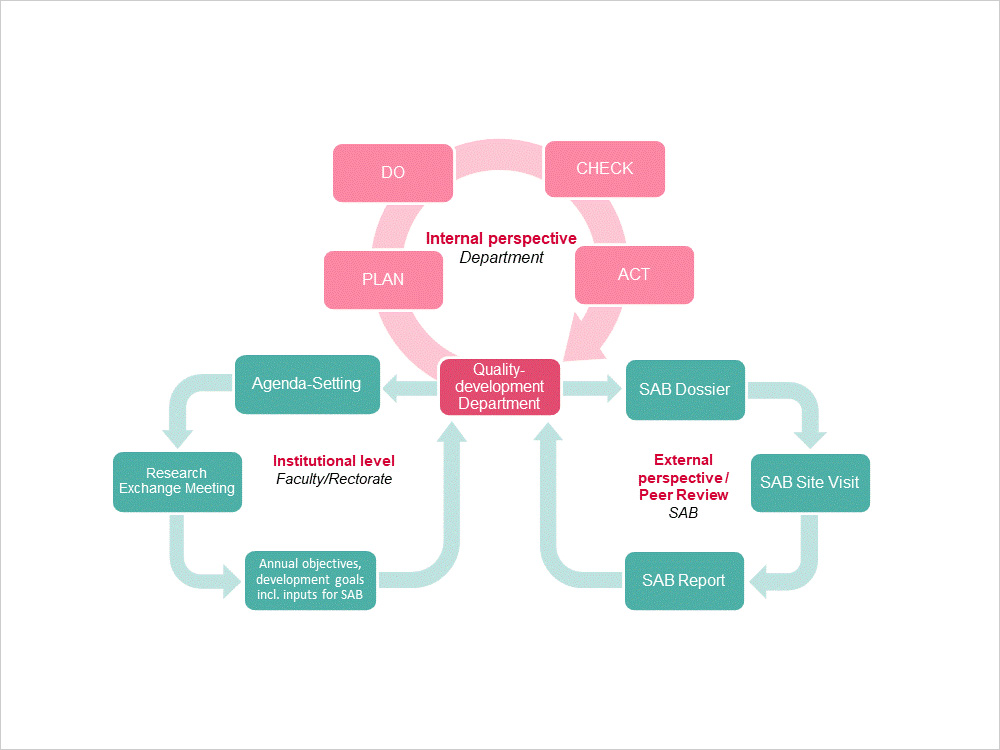Quality Management in Research

As defined in the Strategy 2022-2030, the University of Basel seeks to strengthen both its international visibility and attractiveness as an outstanding research institution by promoting scientific excellence. High-quality research results first and foremost from the intellectual curiosity, motivation and dedication individual researchers have towards their work. In addition, the framework conditions for research play a pivotal role. The individual striving for scientific excellence supported by a well-functioning institutional quality culture therefore builds the basis for cutting-edge research at the University of Basel.
Quality culture in research
A university wide quality culture rests on shared values and a shared quality awareness amongst all members of the institution. Through institutionalized processes of quality development and assurance a quality culture furthermore results in coordinated quality-oriented action (see 'quality culture' definition of the European University Association (EUA)). The University of Basel's quality culture in research is rooted in the values of excellence, freedom of research, scientific integrity, social responsibility, regional anchoring and international cooperation. In addition, institutionalized processes across all relevant organizational levels such as research units, departments, faculties and university governing bodies ensure coordinated quality-oriented action.
(…) quality culture refers to an organisational culture that intends to enhance quality permanently and is characterised by two distinct elements: on the one hand, a cultural/psychological element of shared values, beliefs, expectations and commitment towards quality and, on the other hand, a structural/managerial element with defined processes that enhance quality and aim at coordinating individual efforts.
European University Association (2006). Quality culture in European universities. A bottom-up approach. Brussels. EUA Publications, p.10.
The Conceptual framework for Quality Management in Research developed by the Research Commission defines processes and responsibilities within the realms of quality management in research at the University of Basel. The concept encompasses the various topics of quality management in research; Scientific Advisory Boards, Research Exchange Meetings (Standortgespräche Forschung), procedures of appointing professors and other recruitment procedures, scientific integrity and ethics, as well as research information and performance indicators.
To anchor their quality culture in the international research landscape and in the structures of the University, all departments and faculties are introducing two instruments: Scientific Advisory Boards (SABs) and Research Exchange Meetings. The existing processes of quality development are therefore complemented by the input of an experienced, international panel of external experts (the Scientific Advisory Boards). In addition, so-called Research Exchange Meetings institutionalize a regular exchange on research across the different organizational levels. Guiding principle behind both instruments is that the processes of quality management in research should always be anchored in the professional debate of the subject areas and the respective Scientific Communities. The University of Basel’s quality management therefore aims at a bottom-up quality development that is strongly anchored in the scientific culture of the respective departments and faculties.
Scientific Advisory Boards (SABs)
The scientific discourse on the quality, originality or innovative potential of research activities within the respective Scientific Communities is central to research assessment. Peer Review, i.e. the assessment of research by international experts in the field, therefore plays a central role in quality management processes. An assessment of e.g. the strategic orientation within a research field or of the research performance should in principle be carried out by peers. With the implementation of SABs, recognized experts from outside the university assess the quality and innovativeness of research and make recommendations for the future development of research agendas and framework conditions.
SABs thus advise researchers and executive committees of the organizational units on research issues. These include issues of organization, strategic orientation, research output and performance, research infrastructure, framework conditions for research, services, academic talent promotion, doctoral training, gender equality and diversity efforts, as well as third-party funding acquisition. In addition, the SABs give feedback on the research orientation and performance of researchers and formulate recommendations for their further work and development.
Through an on-site visit, which usually takes place annually, the SABs promote continuous critical reflection and exchange on opportunities, challenges and development potential. The members of a board hold office for at least four years. Contrary to external evaluation procedures by committees composed ad hoc for each procedure, the creation of SABs hence aims at promoting a continuous reflection on potentials and measures for the further development of research agendas and framework conditions.
Research Exchange Meetings
Research Exchange Meetings are held jointly between the Vice President for Research and the heads of departments and Deans of Research. The annual meetings create a space for regular exchange across organizational levels on framework conditions for research, research topics and activities. The interpretation of the insights gained through the SABs and their recommendations for action are subject of the discussions.
By means of the Research Exchange Meetings, the quality development of the departments and faculties is integrated into the overall institutional context. The joint definition of aims and measures ensures coordinated action at the respective organizational levels; departments, faculties, Rectorate and central university units. As an impulse generator, the meetings hence complement the existing processes of development and structural planning (Entwicklungs- und Strukturplanung).
Promoting a sound quality culture fosters agility
Quality management in research at the University of Basel is guided by the quality culture concept and anchored in the scientific discourses of the Scientific Communities. Its structures and processes are agile, it is based on trust which encourages critical self-reflection, and it leads to more exchange across organizational levels which fosters strategic decision-making throughout the university.
The international research landscape in which the University of Basel operates is characterized by rapid change. Quality management in research thus strengthens the University of Basel's agility and thereby contributes to the strategic goal of being able to respond more flexibly and proactively to rapid change.
Links & Downloads
- Conceptual framework for Quality Management in Research (PDF, 297 KB)
- Guidelines for Scientific Advisory Boards at the University of Basel (PDF, 112 KB)
- Guidelines for Research Exchange Meetings at the University of Basel (PDF, 88 KB)
- Scientific Advisory Boards: Fact sheet on conflict of interest and ties of interest (German version) (PDF, 99 KB)
- Scientific Advisory Boards
- Research Committee
- Quality
- Quality in Doctoral Education
- Research Office


